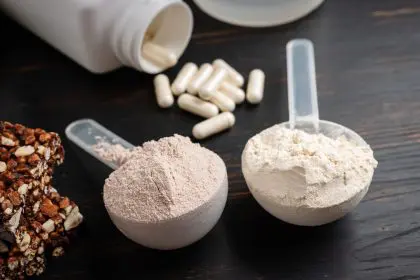Protein shakes have become a popular dietary staple for many fitness enthusiasts and health-conscious individuals. Whether your goal is to build muscle, manage weight, or simply ensure you’re meeting your daily nutritional needs, increasing protein intake is a common objective. Protein shakes provide a quick and easy way to achieve this, but understanding how to incorporate them into your diet effectively is key to making the most of their benefits.
What is a protein shake?
A protein shake is a beverage made by mixing a liquid, such as water or milk, with protein powder. Ready-to-drink options are also available, offering convenience for those on the go. According to nutritionist Jackie Newgent, protein shakes can deliver a significant protein boost, typically containing 20 grams or more per serving. The protein source can vary, with common options including whey, soy, pea, and hemp protein. For additional nutritional benefits, you can enhance the flavor and nutrient profile of your shake by adding fruits, vegetables, or other ingredients like oats, seeds, or nut butter.
The role of protein shakes in your diet
Protein shakes can serve as a valuable addition to your diet, particularly for those who struggle to meet their protein requirements through whole foods alone. Keri Gans, a registered dietitian, emphasizes that these shakes can be a convenient solution, particularly for athletes and active individuals who require higher protein intake for muscle repair and growth. Protein shakes can also function as quick and satisfying meals or snacks, making them ideal for busy mornings or post-workout recovery.
However, it’s essential to remember that protein shakes should complement, not replace, whole foods. Whole food sources of protein, such as lean meats, fish, eggs, legumes, and dairy products, should still be your primary source of nutrition.
How much protein should you aim for each day?
Your daily protein needs can vary depending on factors like age, activity level, and overall health. The general guideline for sedentary adults is 0.36 grams of protein per pound of body weight. However, if you are physically active, aiming for 0.6 to 0.8 grams per pound of body weight may better support muscle growth and recovery. For older adults, a higher protein intake of 1.0 to 1.2 grams per kilogram of body weight is often recommended to help preserve muscle mass.
How many protein shakes should you drink in a day?
Most individuals do not need to rely heavily on protein shakes to meet their protein needs. While they can be a convenient and effective supplement, your primary source of protein should come from whole foods. If you choose to incorporate protein shakes into your diet, one to two shakes per day is typically sufficient for most people.
Before adding protein shakes to your daily routine, it’s important to assess your overall protein intake from food. Consulting with a registered dietitian can help you determine whether protein shakes are necessary based on your individual needs, activity level, and dietary preferences.
Choosing the right protein shake
Not all protein shakes are created equal, so it’s crucial to read labels carefully before selecting a product. Here are some tips for choosing the right protein shake for your diet:
- Look for minimal additives: Choose protein shakes with no added sugars, artificial sweeteners, or unnecessary fillers.
- Check for allergens: If you have food allergies, ensure the protein shake you select doesn’t contain ingredients that may trigger reactions, such as dairy or soy.
- Consider your dietary preferences: If you’re vegan or lactose intolerant, opt for plant-based protein sources like pea, hemp, or brown rice protein.
- Protein quality: Look for high-quality protein sources. For instance, whey protein is a complete protein, meaning it contains all nine essential amino acids, while some plant proteins may be lacking one or more of these.
By ensuring that your protein shake aligns with your dietary preferences and health goals, you can maximize its benefits.
Conclusion
Protein shakes can be a useful tool for boosting protein intake, especially for those who find it difficult to meet their daily requirements through food alone. However, it’s important to view protein shakes as a supplement rather than a substitute for whole food sources of protein. By understanding your unique protein needs and selecting the right product, you can incorporate protein shakes into your diet in a way that supports your overall health and fitness objectives.















